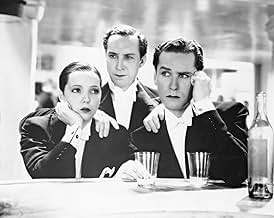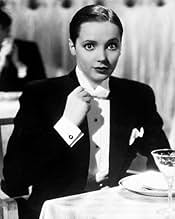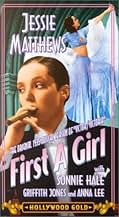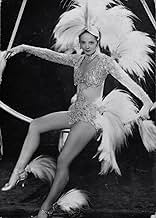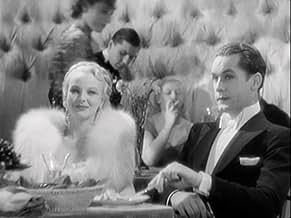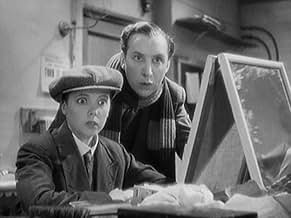Füge eine Handlung in deiner Sprache hinzuElizabeth dreams of being a music-hall singer. She gets to know Victor, that quite unexpectedly gets a female part in a music-hall number. He unfortunately finds himself voiceless, so, why w... Alles lesenElizabeth dreams of being a music-hall singer. She gets to know Victor, that quite unexpectedly gets a female part in a music-hall number. He unfortunately finds himself voiceless, so, why wouldn't Elizabeth replace him in it?Elizabeth dreams of being a music-hall singer. She gets to know Victor, that quite unexpectedly gets a female part in a music-hall number. He unfortunately finds himself voiceless, so, why wouldn't Elizabeth replace him in it?
- Regie
- Drehbuch
- Hauptbesetzung
- Atlas
- (Nicht genannt)
- Cast Member
- (Nicht genannt)
- Cast Member
- (Nicht genannt)
- Cast Member
- (Nicht genannt)
- Man Serving in Cafe
- (Nicht genannt)
- Reporter
- (Nicht genannt)
Empfohlene Bewertungen
Although Matthews was nicknamed "The Dancing Divinity", she does a bit more singing than dancing in this film, not surprising since she was reportedly a popular and prolific recording artist in England. In contrast to some of the dancing ladies of 1930s films, Matthews had a singing voice and didn't need dubbing.
Nevertheless, the dancing she does in this film admirably shows off her abilities. Although she was a proficient tap dancer, here she does not perform any rhythmic tap dances as she did in her other films. The tap dancing she does is more of a soft-shoe performed with co-star, Sonnie Hale, which turns into a nicely done ballroom-style dance, which is part of a large production number.
There is another big production number done with the typical chorus girls and a singer, in which Matthews does not participate. The other big production number features Matthews, again with chorus girls, in which she sings and then performs a freestyle type of dance.
The songs created for this film aren't particularly memorable, and none advanced to the category of "standard", although they are serviceable for the film. The composers may not have household names, but were certainly prolific in that day and you would recognize many of the other songs they have composed, some of which are standards.
It's interesting to see co-star Anna Lee in her early career, somewhat before her emigration to Hollywood, with her hair bleached to platinum blonde in the Jean Harlow style of the 1930s.
This film is interesting to watch, if you'd like to examine the work of Jessie Matthews, or if you just like musicals of the 1930s. This film can be obtained on VHS.
Husband Sonnie Hale teams with Jessie Matthews to great effect, as Victor, the frustrated Shakespearian reduced to working the music halls as a female impersonator, bonds with 'Bill', the would-be song and dance girl who finds herself launched on an inadvertent male career after helping him out with his "Mr Victoria" act one night. As international success unexpectedly beckons, Victor persuades his reluctant new acquaintance to continue the masquerade with the promise that he will shield her constantly from exposure and will never let her down. And part of the charm of this film, as it skirts its way merrily along the censor's line without ever quite transgressing, is that they never do let each other down.
In a move that wrong-foots audience expectations, the odd couple duly fall inconveniently in love -- but not with each other. Predictable bickering and frustrations ensue, feet are put in it and bricks are dropped, and Victor's protective vigilance is sorely tested, but the two share the affectionate reliance of a true 'buddy movie' throughout, and it is this unquestioning trust that helps provide the film's warm-hearted appeal.
Despite its provocative subject matter, which resulted in severe cuts for American release (the constant focus on stratagems to conceal the heroine's true sex only serves to accentuate the issue of what is *not* being shown...), "First a Girl" has an oddly innocent generosity about it. It's one of those happy comedies that seems to take a genuinely sunny view of human nature, with disaster always foiled and characters revealing unexpected better selves. Nothing remotely titillating is ever actually disclosed, of course -- Victor's gallantly-turned back is our security for that -- but as in most cross-dressing cinema, one does have to tacitly presume a considerable degree of blindness on the part of the entire male cast if they can really confuse the girl in man's clothes for a boy, Eton crop or no Eton crop...
Jessie Matthews is, as ever, vivacious, talented and charismatic. As her co-star, Sonnie Hale comes near to stealing the show, with his open, likable persona and his cheerful willingness to be the butt of visual humour on screen, coupled with flashes of sincerity that make us care about the character as more than just a comic foil. Griffith Jones gives a fine performance yet again in the somewhat thankless role of handsome but secondary male lead (see also "Escape Me Never", "The Rake's Progress", "The Wicked Lady").
The dance numbers betray the somewhat cramped facilities available (the big production number at the end had to be filmed outdoors against a black night sky because there simply wasn't a sound stage big enough at the studio) and can feel somewhat gratuitously inserted -- I felt that the restaurant floor-show routine, in which Jessie Matthews doesn't even feature, outlasted its welcome in particular -- but the tunes stayed in my head for several days, and Miss Matthews performs with skill and an infectious gaiety that brings an unheralded smile to the viewer. "Evergreen" remains probably the best vehicle I've seen for her superb singing and dancing talents, coupling the comic potential of another masquerade scenario with more integrated musical performances and greater dramatic depth, but "First A Girl" still has great appeal.
It is still a lovely, happy picture with some really spectacular dance numbers. It's stylishly directed as usual by the maestro, Victor Saville and as a big, flashy musical it's much more impressive than what Hollywood was doing at the time (with the obvious exception of what Zanuck had overseen a few years earlier at Warners.)
Although it adds to the film's overall silliness, what is completely and utterly impossible for your mind to process is that just by cutting her hair, anyone could possibly believe that Jessie Matthews was a man. She was unquestionably the prettiest woman in movies back then (if not, the prettiest woman in the world?) The proposition is beyond sheer madness especially since she doesn't even change her voice, her makeup or her characteristic sensuous style of dancing.
What also seems impossible is that in real life this stunningly beautiful actress was married to Sonny Hale (her co star). Being kind, the nicest comment about his appearance could be be that he didn't have film star looks! However you can start to see what she saw in him. He does have an unusually engaging and warm personality which comes across really strongly in this picture. You might not think so at first but the more you watch him, the funnier he gets.
This is a great uplifting slice of joyful escapism. It's an absolute, absolute must for any fans of spectacular 1930s musicals and silly old-fashioned farces. For those of you unfamiliar with the goddess known as Jessie Matthews however, this one isn't as likely to make you fall in love with her as much as some of her other pictures.
Wusstest du schon
- WissenswertesThe long scarf worn prominently by Sonnie Hale during the early scenes had been knitted for him by Jessie Matthews on the set of her previous film, Evergreen (1934).
- PatzerVictor, the expert in Shakespeare quotes "Is love a tender thing? it is too rough, Too rude, too boisterous, and it pricks like thorn. If love be rough with you, be rough with love" ending with "As You Like It" not the actual "Romeo and Juliet" from which the quote is taken.
- Zitate
Victor: [to 'Bill', about Princess Mironoff] She doesn't know you. Smile!
[Bill smiles awkwardly at the Princess, Victor does so with broad masculine appreciation]
Victor: [aside] Not like *that*. A he-man smile; she's beautiful!
[Bill catches sight of the handsome Robert and her smile widens]
Victor: [acidly] I said the Princess, not the Prince...
- VerbindungenFeatured in Sailing Along (1938)
Top-Auswahl
Details
- Erscheinungsdatum
- Herkunftsland
- Sprachen
- Auch bekannt als
- Mulher Antes de Tudo
- Drehorte
- Produktionsfirma
- Weitere beteiligte Unternehmen bei IMDbPro anzeigen
- Laufzeit
- 1 Std. 34 Min.(94 min)
- Farbe
- Seitenverhältnis
- 1.37 : 1

